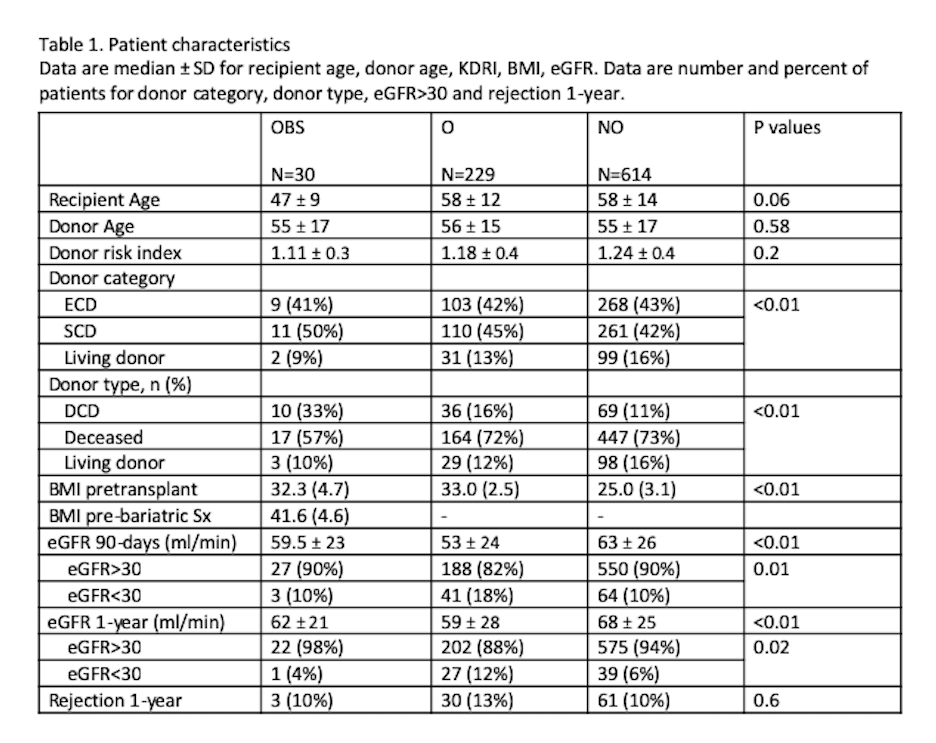The Impact Of Weight Reduction Surgery And Morbid Obesity On Renal Function After Transplantation
S. Negi1, N. Saberi1, P. Bouchard2, a. Andalib2, M. Cantarovich1, S. Paraskevas1, J. Tchervenkov1
1RIMUHC, Montreal, QC, Canada, 2McGill University, Montreal, QC, Canada
Meeting: 2020 American Transplant Congress
Abstract number: 347
Keywords: Kidney transplantation, Laparoscopy, Metabolic complications, Obesity
Session Information
Session Name: Kidney: Cardiovascular and Metabolic Complications II
Session Type: Oral Abstract Session
Date: Saturday, May 30, 2020
Session Time: 3:15pm-4:45pm
 Presentation Time: 4:27pm-4:39pm
Presentation Time: 4:27pm-4:39pm
Location: Virtual
*Purpose: Morbid obesity is a significant barrier and renal transplantation is rarely offered to patients with Class III obesity (body mass index (BMI) > 40 kg/m2). Few studies have looked at the effect of pre-transplant surgical weight loss on post-transplant outcomes. Bariatric surgery (BS) has been safely used in dialysis patients. In the past decade, patients with a BMI>40 and BMI>30 with 2 comorbidities have been referred for BS prior to renal transplantation. Prior to this, our center rarely listed patients with BMI>40. We examined the impact of BS on short term outcomes following renal transplantation (RTx).
*Methods: All patients undergoing RTx (multiorgan Tx were excluded) between Jan 2010 and Nov 2019 were studied (N=873). BS followed by subsequent RTx was performed on 30 dialysis patients during that time for BMI>40 or BMI>30 with 2 or more comorbidities. We compared 3 groups: BMI<30 (Non obese NO, n=614), BMI>30 (obese O, n=229), and BMI>30 with BS (OBS, n=30) for immediate renal function post RTx. Success was defined as eGFR >30ml/min in the first 90 days and one-year post RTx. Statistical analyses were performed using SPSS 20 (IBM, Armonk, NY) and considered significant if p value is 0.05 or less. Categorical data were compared using Pearson chi-square test. Continuous data between 3 groups were compared using one-way analysis of variance, whereas continuous data between the 2 groups was compared using Student t-test.
*Results: There were no differences in the baseline characteristics (Table 1) between groups except for more DCD in the OBS group. BS was successful in weight reduction from an average BMI of 41.6 to 31.9. A higher percentage in the NO and OBS groups achieved success (eGFR>30) compared to the O group in the first 90 days (90%, NO; 90%, OBS vs 82% O. p<0.01) and at one-year (94%, NO; 95.7%, OBS vs 88% O. p<0.01) after RTx (Table 1).
*Conclusions: BS prior to RTx was feasible and successful for most patients and may offer better transplant outcomes. It should be considered as a tool to increase RTx eligibility for obese patients.
To cite this abstract in AMA style:
Negi S, Saberi N, Bouchard P, Andalib a, Cantarovich M, Paraskevas S, Tchervenkov J. The Impact Of Weight Reduction Surgery And Morbid Obesity On Renal Function After Transplantation [abstract]. Am J Transplant. 2020; 20 (suppl 3). https://atcmeetingabstracts.com/abstract/the-impact-of-weight-reduction-surgery-and-morbid-obesity-on-renal-function-after-transplantation/. Accessed February 24, 2026.« Back to 2020 American Transplant Congress

